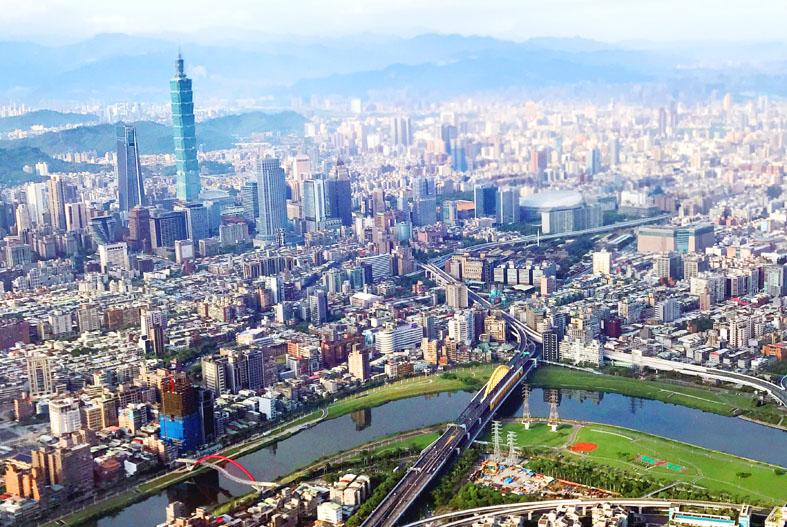A majority of the US public supports defending Taiwan if China invades, according to a US think tank poll released on Thursday.
The Chicago Council on Global Affairs survey, conducted by US research firm Ipsos, showed that 52 percent of the US public support using US troops to defend Taiwan if China invades, the highest level of support recorded since the survey first included the question in 1982.
Sixty percent of Republicans surveyed favored the use of US troops to defend Taiwan, compared with 50 percent of Democrats and 49 percent of independents, the poll showed.

Photo: Reuters
The survey found that 53 percent of Americans support signing a formal alliance with Taiwan, while 46 percent believe in explicitly committing to defend Taiwan if China invades, it said.
The poll showed that 69 percent of the US public believes that the US should recognize Taiwan as an independent country, 65 percent agree that Washington should help Taiwan join international organizations and 57 percent favor the US signing a free-trade agreement with Taiwan.
The US is divided over arms sales to Taiwan, with 50 percent of the public supporting the sale of arms and military equipment to the country, while 47 percent said they were against it, the poll showed.
“Distrust of China is a significant factor in US public support for Taiwan,” the council said.
It said that “US officials often refer to Taiwan as a valued partner in the region,” adding that “the public’s views are broadly similar.”
The poll showed that 30 percent of the US public see Taiwan as an ally or necessary partner, while 32 percent see China as a rival and 29 percent see it as an adversary.
The survey, conducted from July 7 to July 26, had 2,086 valid responses from adults living in the US with a margin of error of 2.33 percentage points.

The Ministry of Foreign Affairs (MOFA) yesterday said it is closely monitoring developments in Venezuela, and would continue to cooperate with democratic allies and work together for regional and global security, stability, and prosperity. The remarks came after the US on Saturday launched a series of airstrikes in Venezuela and kidnapped Venezuelan President Nicolas Maduro, who was later flown to New York along with his wife. The pair face US charges related to drug trafficking and alleged cooperation with gangs designated as terrorist organizations. Maduro has denied the allegations. The ministry said that it is closely monitoring the political and economic situation

Conflict with Taiwan could leave China with “massive economic disruption, catastrophic military losses, significant social unrest, and devastating sanctions,” a US think tank said in a report released on Monday. The German Marshall Fund released a report titled If China Attacks Taiwan: The Consequences for China of “Minor Conflict” and “Major War” Scenarios. The report details the “massive” economic, military, social and international costs to China in the event of a minor conflict or major war with Taiwan, estimating that the Chinese People’s Liberation Army (PLA) could sustain losses of more than half of its active-duty ground forces, including 100,000 troops. Understanding Chinese

UNRELENTING: China attempted cyberattacks on Taiwan’s critical infrastructure 2.63 million times per day last year, up from 1.23 million in 2023, the NSB said China’s cyberarmy has long engaged in cyberattacks against Taiwan’s critical infrastructure, employing diverse and evolving tactics, the National Security Bureau (NSB) said yesterday, adding that cyberattacks on critical energy infrastructure last year increased 10-fold compared with the previous year. The NSB yesterday released a report titled Analysis on China’s Cyber Threats to Taiwan’s Critical Infrastructure in 2025, outlining the number of cyberattacks, major tactics and hacker groups. Taiwan’s national intelligence community identified a large number of cybersecurity incidents last year, the bureau said in a statement. China’s cyberarmy last year launched an average of 2.63 million intrusion attempts per day targeting Taiwan’s critical

‘SLICING METHOD’: In the event of a blockade, the China Coast Guard would intercept Taiwanese ships while its navy would seek to deter foreign intervention China’s military drills around Taiwan this week signaled potential strategies to cut the nation off from energy supplies and foreign military assistance, a US think tank report said. The Chinese People’s Liberation Army (PLA) conducted what it called “Justice Mission 2025” exercises from Monday to Tuesday in five maritime zones and airspace around Taiwan, calling them a warning to “Taiwanese independence” forces. In a report released on Wednesday, the Institute for the Study of War said the exercises effectively simulated blocking shipping routes to major port cities, including Kaohsiung, Keelung and Hualien. Taiwan would be highly vulnerable under such a blockade, because it